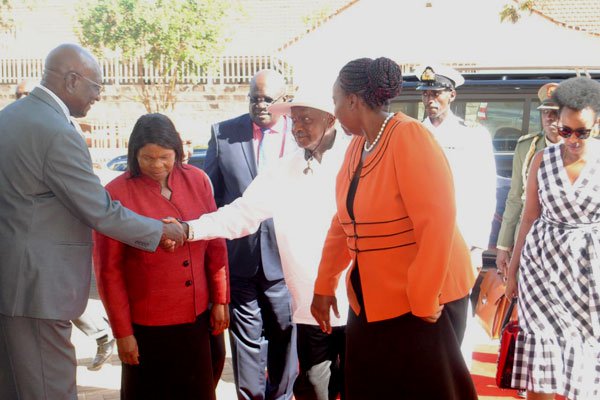
NAIROBI – Kenyan Police on Friday were forced to lob tear gas canisters at rowdy Kenyatta University students who were shouting pro-Bobi Wine chants outside a building where President Yoweri Museveni was giving a public lecture.
The students numbering tens at first complained about being locked out of the amphitheater where Mr. Museveni was giving his lecture at the main campus on Thika-Nairobi highway.
At first, the students where chanting “haki yetu” (our right) which later morphed into pro-Bobi Wine slogans.
Mr. Wine is a Kaydondo East Member of Parliament in Uganda and musician who has been vocal against Mr. Museveni’s leadership.
Mr. Wine early this years confirmed that he will be challenging long-serving and incumbent President in the next presidential polls.
Before leaving Nairobi, I delivered a public lecture at Kenyatta University on the subject of African integration. I gave my audience a background to Africa and its civilization, indicating that 5,000 years ago, Africa was the most civilized continent. pic.twitter.com/lHeJga7FS8
— Yoweri K Museveni (@KagutaMuseveni) March 29, 2019
The chants continued throughout Mr. Museveni’s address eventually prompting police officers to intervene by throwing teargas canisters at the students to clear the way for M.r Museveni’s when he was done giving his lecture.
Mr. Museveni on Friday ended his three-day state visit to Kenya’s coastal city of Mombasa on the invitation of President Uhuru Kenyatta.
I thank the university’s management for inviting me. Importantly, I thank President Uhuru Kenyatta who invited me on a three-day state visit to Kenya. He came to see me off before I went to deliver the lecture. I thank him for the hospitality extended to my entourage and myself. pic.twitter.com/5fw4gcgEJ3
— Yoweri K Museveni (@KagutaMuseveni) March 29, 2019
During his stay in Kenya, Museveni has negotiated deals where Ugandan and Kenyan traders will be the biggest beneficiaries after their two countries on Wednesday signed a raft of agreements meant to ease trade, cement political ties and improve their social/cultural connections.
The agreements, clustered into three major categories; defence, trade, and social affairs, focus on not only easing means of doing business between the two countries but also resolve some of the sticking issues that have hampered trade.
For example, the pacts direct Kenya to consider an increase of its sugar quota imported from Uganda to 90,000 metric tonnes from the current 36,000 tonnes.
Uganda has been tasked to formally lodge a request to this effect that would create a market for at least 54,000 metric tonnes of its surplus 90,000 metric tonnes it produces annually.
On the other hand, beef exporters in Kenya can expect to tap into the Uganda market after the latter was directed to lift its ban on beef and beef products from Kenya with immediate effect.
The poultry industry in Uganda will also have reason to smile after Kenya agreed to lift the ban on poultry products from Uganda within a week, dependent on Ugandan authorities furnishing them with necessary information making a case for the decision.
Another sector set to profit is the tile makers after it was agreed that a joint verification of their quality be conducted within two weeks and thereafter they can be exported to Kenya.
For dairy producers in Uganda, it should be good news after Kenya agreed to do away with a host on non-tariff barriers that were affecting their exports. For example, they will no longer need authority from the Livestock Department of Kenya to export milk to the neighbouring country.
Kenya also clarified that it has resumed issuance of importation permits of dairy products from Uganda, which had stopped on February 1st this year.







